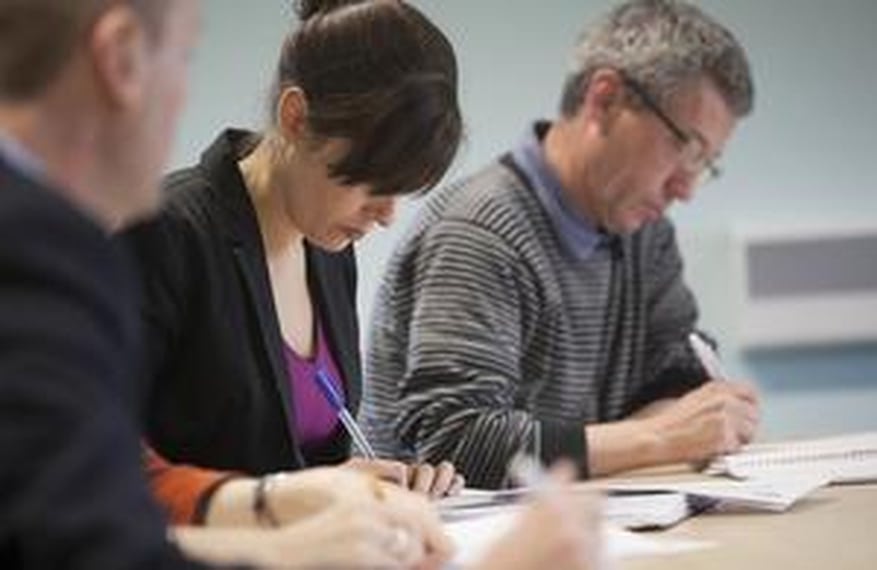Fewer than 5% of people in many countries benefit from adult learning opportunities

In almost one-third of countries, fewer than five per cent of adults aged 15 and above participate in education and learning programmes, according to UNESCO’s fourth Global Report on Adult Learning and Education (GRALE 4). Adults with disabilities, older adults, refugees and migrants, minority groups and other disadvantaged segments of society are particularly under-represented in adult education programmes and find themselves deprived of crucial access to lifelong learning opportunities.
Published yesterday (5 Dec) by the UNESCO Institute for Lifelong Learning, the report monitors the extent to which UNESCO Member States put their international commitments regarding adult learning and education into practice and reflects data submitted by 159 countries. It calls for a major change in the approach to adult learning and education (ALE) backed by adequate investment to ensure that everyone has the opportunity to access and benefit from adult learning and education and that its full contribution to the 2030 Agenda for Sustainable Development is realized.
“We urge governments and the international community to join our efforts and take action to ensure that no one – no matter who they are, where they live or what challenges they face – is left behind where the universal right to education is concerned,” says UNESCO Director-General Audrey Azoulay, endorsing the report’s recommendations. “By ensuring that donor countries respect their aid obligations to developing countries, we can make adult learning and education a key lever in empowering and enabling adults, as learners, workers, parents, and active citizens.”
The publication stresses the need to increase national investment in ALE, reduce participation costs, raise awareness of benefits, and improve data collection and monitoring, particularly for disadvantaged groups.
Progress in participation in adult learning and education is insufficient
Despite low participation overall, many more than half of responding countries (57% of 152) reported an increase in the overall participation rate in adult learning and education between 2015 and 2018. Low-income countries reported the largest increase in ALE participation (73%), trailed by lower middle income and upper middle income countries (61% and 62%).
Most increases in adult learning and education participation were in sub-Saharan Africa (72% of respondents), followed by the Arab region (67%), Latin America and the Caribbean (60%) and Asia and the Pacific (49%). North America and Western Europe reported fewest increases (38%) though starting from higher levels.
The data shows persistent and deep inequalities in participation and that key target groups such as adults with disabilities, older adults, minority groups as well as adults living in conflict-affected countries are not being reached.
Women’s participation must improve further
While the global report shows that women’s participation in ALE has increased in 59 per cent of the reporting countries since 2015, in some parts of the world, girls and women still do not have sufficient access to education, notably to vocational training, leaving them with few skills and poor chances of finding employment and contributing to the societies they live in, which also represents an economic loss for their countries.
Quality is improving but not fast enough
Quality ALE can also provide invaluable support to sustainable development and GRALE 4 shows that three-quarters of countries reported progress in the quality of education since 2015. Qualitative progress is observed in curricula, assessment, teaching methods and employment conditions of adult educators. However, progress in citizenship education, which is essential in promoting and protecting freedom, equality, democracy, human rights, tolerance and solidarity, remained negligible. No more than 3% of countries reported qualitative progress in this area.
Increase in funding for adult learning and education needed
GRALE 4 shows that over the last ten years, spending on adult learning and education has not reached sufficient levels, not only in low-income countries but also in lower middle income and high-income countries. Nearly 20% of Member States reported spending less than 0.5 per cent of their education budgets on ALE and a further 14% reported spending less than 1 per cent. This information demonstrates that many countries have failed to implement the intended increase in ALE financing proposed in GRALE 3 and that ALE remains underfunded. Moreover, under-investment hits socially disadvantaged adults the hardest. Lack of funding also hampers the implementation of new policies and efficient governance practices.
The UNESCO Global Report on Adult Learning and Education (GRALE) monitors whether UNESCO Member States are putting their international commitments on adult learning and education into practice. These commitments are set out in the Belém Framework for Action (2009), the outcome document of the 6th International Conference on Adult Education (CONFINTEA VI, Belém, Brazil), and the Recommendation on Adult Learning and Education (2015). In addition to this monitoring function, each issue of GRALE examines a particular topic, the 2019 edition focusses on participation. GRALE is published every three years. The Report combines survey data, policy analysis and case studies to provide policy-makers and practitioners with recommendations and examples of good practice. It presents evidence on how adult learning and education helps countries address current challenges and contributes to achieving the Sustainable Development Goals.











Responses